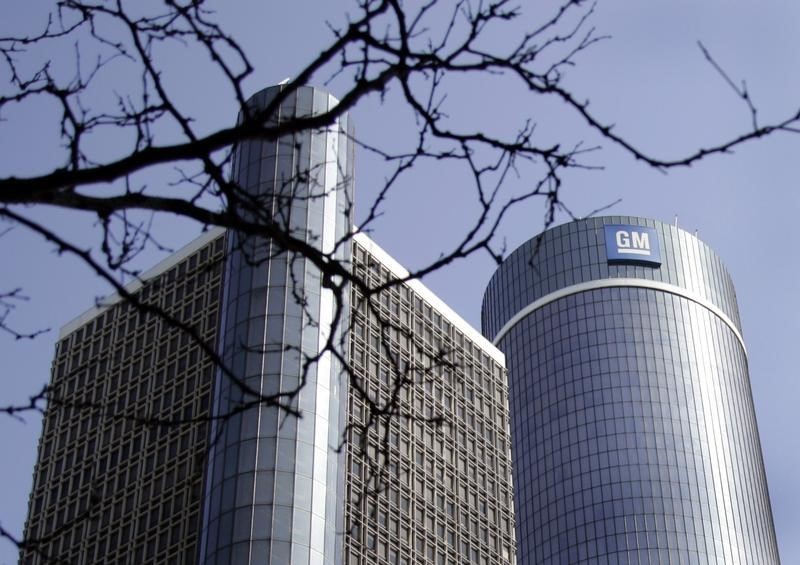By Ben Klayman
DETROIT (Reuters) - Chief Executive Mary Barra's plan to keep a big cash cushion for General Motors Co (N:GM) is under attack from a group of shareholders led by a member of the auto task force that helped restructure the company during its 2009 bankruptcy.
Harry Wilson, who was a member of the government-appointed task force, notified the Detroit automaker on Monday that he wanted it to spend $8 billion to buy back shares, and that he will nominate himself for election to the board of directors this spring. GM, which has 13 people on its board, disclosed the letter on Tuesday.
"The company's common stock is substantially undervalued, the company is substantially overcapitalized and this repurchase of undervalued shares will create substantial shareholder value," Wilson said in his letter.
GM shares were up 2.8 percent at $37.02 in the afternoon.
Wilson, 43, said he had joined with David Tepper's Appaloosa Management and three other hedge funds: Taconic Capital Advisors, Hayman Capital Management and HG Vora Capital Management, which together own about 34.4 million shares, or 2.1 percent of GM stock.
Wilson, who last May called GM's shares "woefully undervalued," will receive a percentage of the group's profit from their investment in the company.
While GM reiterated that it acts in the best interests of shareholders, the plan launched by Wilson and the funds is a direct challenge to the company's board. The company declined to make any executives or the chairman, Tim Solso, available to comment.
Wilson intends to nominate himself as a candidate for the board at the 2015 annual shareholders' meeting and offer a proposal to complete the share buyback program within a year. GM traditionally holds its annual meeting in June. He also said he could nominate additional people to join the board, whose members are all up for election this year.
Wilson, who notified GM of his intentions during a Feb. 3 meeting with Barra about unrelated issues, could not immediately be reached for comment.
PICKING UP THE PACE
GM has come under increasing pressure to return some of its $37 billion in liquidity, including $25 billion in cash, to shareholders.
The company said last week it will increase the quarterly dividend by 20 percent, and that it has boosted capital spending plans for 2015, also by 20 percent, to $9 billion. Chief Financial Officer Chuck Stevens told Reuters that more cash could be returned to investors as soon as the second half of the year, and GM wanted to maintain its cash on the high end of the range of $20 billion to $25 billion.
Analysts said Wilson's proposal was essentially calling for GM to accelerate its pace of cash return to investors. Barclays analyst Brian Johnson said it is likely the automaker will implement some sort of buyback, perhaps for half the amount that Wilson's group is seeking.
J. Kyle Bass, Hayman's chief investment officer, declined to comment, referring questions to Wilson. A spokesman for Taconic also declined to comment. Officials with the other two funds could not immediately be reached.
Wilson, CEO of Maeva Group Llc which he founded in January 2011, said in the letter he has talked with other investors, but did not indicate whether they would support his efforts. GM said because Wilson missed the Dec. 31, 2014, deadline to submit a proposal for inclusion in the company proxy, he will have to issue his own proxy.
GM said it has been in regular contact with some of the investors identified in the group as recently as Feb. 4, and that they did not indicate their intention to nominate directors. The company said its board will evaluate Wilson's candidacy and make a recommendation.
PREVIOUS POWER STRUGGLES
GM has been at the center of corporate power struggles before.
In the 1980s, Texas billionaire H. Ross Perot, then GM's largest shareholder, started a war with then-Chairman Roger Smith which ultimately led GM to buy out Perot's shares in 1986.
In 1992, GM's independent directors, guided by corporate governance expert Ira Millstein, deposed CEO Bob Stempel as the company careened to the edge of bankruptcy. In that case, board members led the coup, cheered on by investors.
In 2005, billionaire Kirk Kerkorian bought a stake in GM, and later urged then-GM CEO Rick Wagoner to forge an alliance with the Renault-Nissan Alliance, run then and now by Carlos Ghosn. Wagoner and GM's board successfully resisted Kerkorian's plans, and he sold his shares in 2006.
Three years later, GM was taken over by the U.S. government and restructured in a taxpayer-funded bankruptcy. Wilson was a member of a task force appointed by President Barack Obama to guide the overhaul.
Today, the post-bankruptcy GM has fewer defenses against disgruntled shareholders than many other global automakers, which are shielded by either a strong family shareholder group – such as Fiat Chrysler Automobiles NV (N:FCAU), Ford Motor Co (N:F) and BMW AG (DE:BMWG) – or a significant government stake, as at Volkswagen AG (DE:VOWG_p) and Renault SA (PA:RENA).

One of the last government entities to have a stake in GM, the government of the Canadian province of Ontario, sold its remaining shares in the automaker earlier this month. The Canadian federal government still owns a 4.6 percent stake in GM. The U.S. government sold its last shares in GM in late 2013.